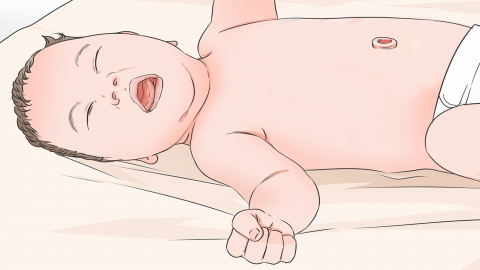What should I do if a newborn has hiccups?
Generally, hiccups in newborns may be caused by factors such as incomplete nervous system development, swallowing air, indigestion, gastroesophageal reflux, and other related causes. General treatments and medication therapy can be used to improve the condition. Prompt medical consultation is recommended, and treatment should follow medical advice. Details are as follows:

1. Incomplete Nervous System Development: The nervous system of a newborn is still in a stage of rapid development and has relatively weak control over the diaphragm, making it prone to spasmodic contractions when stimulated, resulting in hiccups. No special treatment is required. Parents can help alleviate hiccups by gently patting the newborn's back, providing gentle massage, or diverting the baby's attention.
2. Swallowing Air: During feeding, if a newborn eats too quickly or eagerly, large amounts of air may be swallowed into the stomach, stimulating the diaphragm and causing hiccups. Parents should adjust the feeding posture, ensuring the newborn's head is higher than the body to reduce the chance of swallowing air. After feeding, hold the baby upright and gently pat the back to help expel air from the stomach.
3. Indigestion: If a newborn consumes excessive amounts of milk, the stomach may become overburdened, leading to secondary indigestion. Indigestion can cause increased gas in the stomach, stimulating the diaphragm and causing hiccups and belching. Under a doctor's guidance, medications such as Xingpi Yang'er Granules, Infant Jianpi Granules, or Pediatric Compound Chicken Gold Powder may be used to aid digestion.
4. Gastroesophageal Reflux: Newborns have poor function of the lower esophageal sphincter and a small, horizontally positioned stomach, making gastroesophageal reflux more likely. Refluxed contents can stimulate the diaphragm, causing spasms and resulting in hiccups, as well as vomiting. Under medical guidance, medications such as Pediatric Jianpi Pills, Jianwei Xiaoshi Tablets, or Domperidone Suspension may be used to promote gastrointestinal motility.
5. Acute Gastroenteritis: This is generally associated with pathogen invasion, ingestion of spoiled formula, and other factors. A newborn's gastrointestinal tract may be invaded by inflammatory factors, often leading to secondary symptoms such as vomiting, fever, and diarrhea. During vomiting, refluxed contents can stimulate the diaphragm, causing spasms and resulting in hiccups. Medications may be used under medical guidance, such as Amoxicillin Granules, Ribavirin Granules, or Smectite Powder, to provide anti-inflammatory and antidiarrheal effects.
During treatment, parents should ensure proper feeding hygiene and keep the newborn's buttocks clean.









